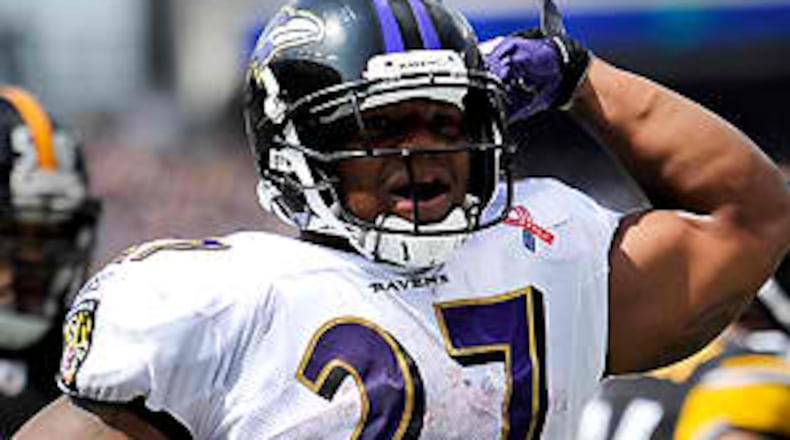Writing in Politico, National Review editor Rich Lowry condemns what he believes to be excessive media coverage of the NFL and its mishandling of domestic violence issues. The hysteria has been so over the top that "you'd think that the fate of justice in America depends on how harshly the NFL punishes a few miscreants," he writes. "Only if Ray Rice and accused child-abuser Adrian Peterson are banished from the game do women and children have a chance of living in a country where they are safe from violence and abuse."
"We really shouldn’t be expecting (the NFL) to set our society’s standards," he writes.
I disagree, but before I explain why, an important caveat: I'm not trying to make Lowry the bad guy here; he has written a thoughtful column that takes domestic violence seriously, and along the way he makes valid points about media obsession and overkill and about the violence that is inherent in the NFL's product. I just see something more serious and positive playing out here.
For example, I think Lowry has the larger issue backwards. Nobody expects the NFL to set the rules for society; that's not what this is about. However, society can and should set the rules for the NFL, and that's the process that is now playing out. The "boys will be boys" attitude that once protected athletes from repercussions -- an attitude that helps explain the initial two-game suspension handed out to Rice -- is disappearing and disappearing quickly. They're no longer going to be judged by an easier standard; they will be and should be judged by a higher standard, concomitant with their higher visibility and the higher paychecks that come with it. If you're a gifted athlete who can't or won't live by that higher standard -- and I'm looking at you, Jameis Winston -- then you have no place in the game.
At some level, that's just business. If you're selling a product of ritualized, somewhat sanitized violence, you better ensure that the violence stays ritualized and sanitized. In his essay, Lowry suggests that the attention drawn by the Rice and Peterson cases may be "convenient ways to express a deeper discomfort with the NFL, which sacrifices men’s bodies and minds for our viewing pleasure every week," and I think that's right. It's also why resolving those issues is so important to the NFL's future.
Elsewhere, however, Lowry argues that "No matter how many sermonettes we hear to the contrary, the NFL is not the key to fighting domestic violence. In fact, it has no connection to it whatsoever."
Again, I disagree. I would argue that thanks to the NFL, national attitudes toward domestic violence have changed more in the last few weeks than they have in a decade. I'm not talking official attitudes, I'm talking attitudes at the cultural level, the level where it really matters.
I would bet that in the wake of this national debate, police officers and prosecutors around the country are now more likely to pursue cases than they were a month ago. I would bet that millions of men are more likely to judge their own behavior, and that of male friends and relatives, by a higher standard. Most of all, I would bet that a lot of women who had previously accepted domestic violence as more or less the unescapable norm are now seeing that it is NOT the norm, that in fact society sees it as aberrant behavior and that they have the right to demand better.
You see that change playing out in the handling of a case of a federal judge from Alabama who was recently arrested here in Atlanta on charges of domestic violence. The initial response to the arrest of U.S. District Judge Mark Fuller was that whatever happened to his case in the legal system, his position on the bench was not at issue thanks to his lifetime appointment. Now, however, both U.S. senators from Alabama have called on Fuller to resign.
"The American people's trust in our judicial system depends on the character and integrity of those who have the distinction and honor of sitting on the bench, and I believe Judge Mark Fuller has lost the confidence of his colleagues and the people of the state of Alabama and I urge him to resign immediately," Sen. Richard Shelby said Wednesday. Two members of Congress from Alabama had previously made a similar demand, and if Fuller doesn't step down voluntarily, the threat of removing him via impeachment has been raised.
Fuller was arrested Aug. 10. Without the spate of publicity about the NFL's approach to domestic violence (and sadly, new chapters continue to be written), it's highly likely that he would have quietly returned to his job on the federal bench without a lot of controversy. Back in the dark ages of a month ago, domestic violence just wasn't seen as that big of a deal, and it certainly wasn't something that should threaten the career of a famous running back or a federal judge.
In other words, we're witnessing a major shift in societal attitude and I don't think that change will be temporary. I also think that as a result of that shift, a lot of women and children are going to feel safer in their own living rooms and bedrooms, and if the NFL and media overkill have served as a catalyst for that change, it has done all of us an unlikely service.
About the Author
The Latest
Featured



